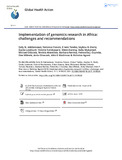Implementation of genomics research in Africa: challenges and recommendations

View/
Date
2018-01-16Author
Adebamowo, S. N.
Francis, V.
Tambo, E.
Diallo, S. H.
Landouré, G.
Nembaware, V.
Dareng, E.
Muhamed, B.
Odutola, M.
Akeredolu, T.
Nerima, B.
Ozumba, P. J.
Mbhele, S.
Ghanash, A.
Wachinou, A. P.
Ngomi, Nicholas N.
Metadata
Show full item recordAbstract
Background: There is exponential growth in the interest and implementation of genomics research in Africa. This growth has been facilitated by the Human Hereditary and Health in Africa (H3Africa) initiative, which aims to promote a contemporary research approach to the study of genomics and environmental determinants of common diseases in African populations.
Objective: The purpose of this article is to describe important challenges affecting genomics research implementation in Africa.
Methods: The observations, challenges and recommendations presented in this article were obtained through discussions by African scientists at teleconferences and face-to-face meetings, seminars at consortium conferences and in-depth individual discussions.
Results: Challenges affecting genomics research implementation in Africa, which are related to limited resources include ill-equipped facilities, poor accessibility to research centers, lack of expertise and an enabling environment for research activities in local hospitals. Challenges related to the research study include delayed funding, extensive procedures and interventions requiring multiple visits, delays setting up research teams and insufficient staff training, language barriers and an underappreciation of cultural norms. While many African countries are struggling to initiate genomics projects, others have set up genomics research facilities that meet international standards.
Conclusions: The lessons learned in implementing successful genomics projects in Africa are recommended as strategies to overcome these challenges. These recommendations may guide the development and application of new research programs in low-resource settings.
URI
https://pubmed.ncbi.nlm.nih.gov/29336236/https://www.ncbi.nlm.nih.gov/pmc/articles/PMC5769805/
https://www.researchgate.net/publication/321904962_Implementation_of_Genomics_Research_in_Africa_Challenges_and_Recommendations
https://www.academia.edu/35775631/Implementation_of_genomics_research_in_Africa_challenges_and_recommendations
https://eraonline.uct.ac.za/converis/portal/detail/Publication/46448532?auxfun=&lang=en_GB
http://hdl.handle.net/123456789/4548
Collections
- Journal Articles (PAS) [273]
